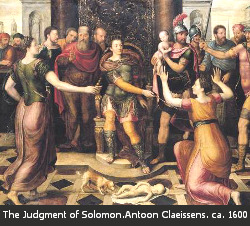Finding the Will of God
It is a commonly held belief among Christians that one of the most perplexing problems we experience is knowing what the will of God is for our lives. The reason for this is not hard to find. For one thing, we are most sensitive to this question in times of stress, when the stakes are high and our emotions are perturbed. We want a clear path to appear in front of us—we want to know what our heavenly Father would have us do. In these situations we turn to God and pray for guidance. But frequently we discover that the help does not come to us when and how we think it should, and we begin to wonder if there is some secret key to the will of God which we need to discover.
1. The Problem with Fleeces
Everyone is familiar with what Gideon did when he wanted absolute assurance that he was not deluded, but that the Lord truly had told him to take on the Midianites—he laid a fleece out, not once but twice (Judg. 6:36-40).
Discussion
The Wisdom of This World
CHAPTER III - THE WISDOM OF THIS WORLD
BY REV. A. W. PITZER, D. D., LL. D., SALEM, VIRGINIA
“There is a growing impression among eminent private thinkers that Christianity is losing its hold upon men, and that the Church is a waning power; that the religious world is drifting from its moorings, and faith is becoming a tradition of the past.”
Discussion
Embrace Disillusionment
When wisely managed, disillusionment is a beneficial misery. It qualifies as what the Puritans called “a severe mercy”—a torment that purifies the soul. Since disillusionment is emotionally painful, we naturally regard it as an enemy. But to be disillusioned is to be set free from illusion, and that is never bad. Disillusionment bursts an illusion much as a pin pops a balloon. The experience is jarring; but in the case of illusions, it is equally liberating.
Discussion
Wisdom - Wise People Crave It!

About three years ago, I decided to preach through a single chapter of the book of Proverbs. No one, it seems, does this. Most sermons that address Proverbs are either solo shots or they cluster a number of proverbs by theme. But to get the most from the book—in my opinion—one must contemplate each specific proverb.
Most of the proverbs in the book of Proverbs were written by Solomon, whom we also believe wrote Ecclesiastes and Song of Solomon. Solomon was noted for many things: his great power, his huge empire, his great wealth, his many wives and concubines (1,000 total, 1 Kings 11:3), and certainly his great wisdom.
Solomon’s wisdom was a special gift from God, but Solomon himself often chose to make decisions that ignored the very wisdom he had asked God to give him. It is one thing to know the right course, another to follow it.
When we deal with Solomon, his wisdom, and the nature of wisdom, we must narrow our focus. Here, I would like to highlight an important principle: wise people crave more and more wisdom, for wisdom is given to those who value it.
I have long compared the love of wisdom to the love of cooking. The best cooks are usually cooks who enjoy cooking. Many folks cook out of necessity but do not enjoy it—to them, cooking translates to heating food. The love of cooking itself entices cooks to be creative, improve, and learn from others. Same thing with wisdom; those who love it pursue it and attain more wisdom. It is almost of a case of, “to him who has, more will be given.”




Discussion